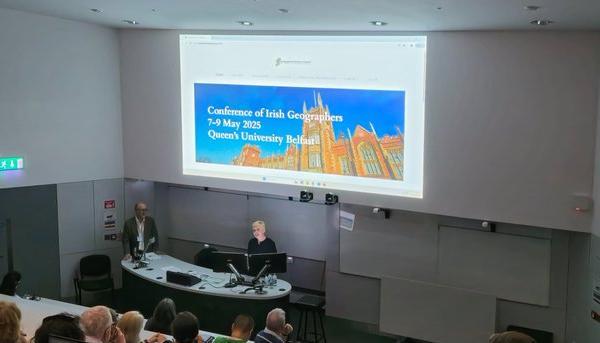Queen's hosts Conference of Irish Geographers
In May of 2025, the Conference of Irish Geographers was hosted at Queen’s University Belfast. Several members of ENSGOV participated in the conference, which focused on the theme of ‘Adaptation’.

By debating the adaptability of research to address key questions and issues facing the world, as well as reflecting on the ways through which cultures and societies adapt to a changing world, the conference created an engaging space to consider how future challenges will be met through new technologies, techniques, and philosophies.
On day one of the conference, Ben McAteer chaired and presented in a session on city and regional governance. The session included talks on community planning in Ireland, the governance of Chengdu's industrial heritage regeneration, co-creation as a means of democratising urban governance, and how planning can facilitate age-friendly neighbourhoods. Ben concluded the session by presenting his research, co-authored with Professor Wesley Flannery, on the opportunities and challenges associated with the professionalisation of citizen science. This paper debates the reality of government involvement in citizen science, wherein partnerships can simultaneously facilitate pathways for projects to inform policy while also enabling government to police projects through epistemologically unsuitable data standards and short-term funding time-frames.
The second day of the conference included a session titled ‘Marine Governance and the Blue Economy’. This was chaired by Wesley Flannery and involved talks from both Christina Kelly and Ben McAteer. Christina presented a talk on adaptation in the Irish energy system, using the case study of floating offshore wind in the Celtic Sea. This research stems from Christina’s work in the PERMAGOV project, which fellow ENSGOV member Lindsey West also contributes. The project sets out to contribute to the European Green Deal by improving implementation and performance of EU marine policies related to marine biodiversity, marine litter, marine energy, and maritime transport. Later in the session, Ben presented a talk titled ‘Assessing the enablers and barriers of adaptive marine governance’. This piece is informed by his work on the MarinePlan project, which assesses the linkages between Marine Spatial Planning and Marine Protected Areas. Further presentations in the session were given on the topics of aquaculture and the vulnerability of coastal communities.
The conference provided an excellent opportunity to showcase some of the research conducted by ENSGOV members, with a broad range of academics and practitioners showing interest. Additionally, it proved to be an interesting chance to learn about the results and conclusions of other studies, as well as a space to network and engage with participants.

